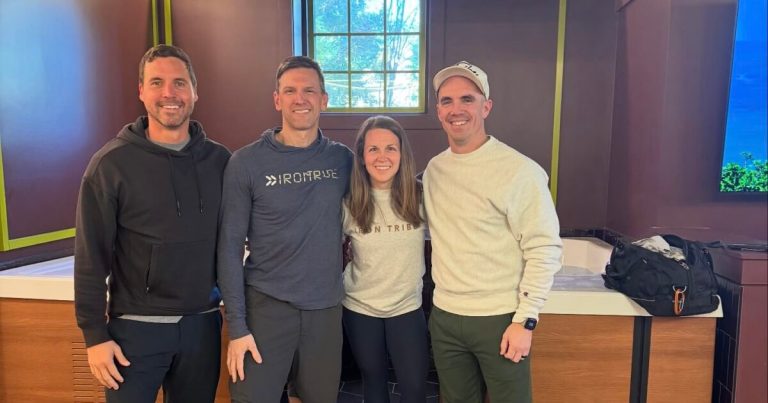4 women physicians at Brookwood Baptist Health offer 5 pro tips for how to live your best life
Reading time: 5 minutes
Sponsored

March is Women’s History Month, so we thought it would be a good time to ask women physicians for their women’s health pro tips. Here’s what four doctors with Brookwood Baptist Health had to say.
Meet the 4 women doctors we interviewed at Brookwood Baptist Health

- Dr. Cameron Askew is a bariatric (surgical weight loss) and general surgeon at Brookwood Baptist Medical Center in Birmingham. Born and raised in Alabama, she’s married, with two stepsons and two dogs. She loves all things outdoors, weightlifting and traveling.
- Dr. Bridget Brunner is an OB/GYN in Jasper, Alabama. She grew up in the area she serves and was excited to move back and provide a needed service to her community. Married with two children, 8 and 6, she’s personally experienced most of the aspects of care that she provides for her patients.
- Dr. Anne Davis has been a practicing internal medicine doctor for the last 17 years in her hometown of Talladega. For the first 13 years, she worked with her father, who retired from internal medicine after practicing in Talladega for 40+ years. She loves taking care of people in the community in which she was raised. She particularly enjoys caring for multiple generations and members of families, which gives her work great depth and context.
- Dr. Erin Townsley has been practicing internal medicine at Princeton Baptist Medical Center for over 12 years. She’s also been involved in medical education and training her entire career. She grew up in Birmingham and is passionate about serving this community, particularly the underserved population who has limited access to care. She has two boys, ages 7 and 4, and her husband is a pediatric cardiac anesthesiologist at Children’s Hospital.
When I asked each doctor for her best advice for how women can get and stay healthy, some clear common themes emerged:
1. Recognize your role as caretaker + put yourself on the list of people who need to be taken care of

Every doctor I spoke to said some variation of “women take on the role of caretaker for others.” They then went on to add the following:
- We can’t take care of those other people unless we keep ourselves in good shape physically and mentally (Dr. Brunner).
- Women often put our own health needs on the back burner, especially during times of family crisis (Dr. Davis).
- It’s important that women take time for our own well-being (Dr. Townsley).
Dr. Davis had additional words of wisdom for caregivers right now:
- Try to carve out time for yourself for things that will give you the ability to remain strong, like sleep, regular exercise and healthy eating.
- Mobilize the resources that you have to reduce your workload if you can.
- Try to forgive yourself for not being all things to all people in your life—we are oftentimes our worst critics!
Find just the right physicians who can help you get and stay healthy.
2. Prioritize preventive care for better women’s health

Anne B. Davis, MD. Photo via Brookwood Baptist Health 
Bridget Brunner, MD. Photo via Bridget Brunner
- Although specific preventive care needs change throughout women’s lives, it’s important to visit your doctor regularly in every phase of life.
- Finding and building a relationship with a primary care physician you trust is super-important.
- Schedule annual visits so they can check your overall health and labs.
- Screening tests can detect and allow treatment for many problems in the early stages. These include:
- Mammogram for breast cancer
- Colonoscopy for colon cancer and other problems
- Pap smear for cervical cancer
- Bone density scan for osteoporosis
3. Heart health matters to women’s health

It’s really important for women to pay attention to heart health.
“Heart disease can sometimes have more vague symptomatology in women and may not present with classic, textbook features, so it is important for us to be educated about that and learn how to recognize issues early on and seek medical attention.”
Dr. Townsley
Last month, we wrote about one great example of this: Atrial Fibrillation, or AFib. Even though it’s the most common heart rhythm problem in the country, a lot of people first hear about it after someone they love has had a stroke. Don’t let that be you or your loved one.
4. Mental illness isn’t weak, and it’s okay to need—and get—help

In line with the tendency to put everybody else’s needs first and the need to prioritize self-care, it’s really important to pay attention to your mental health.
Dr. Askew recommends “seeing a counselor or mental health professional any time you are dealing with excessive stress, anxiety or are concerned about depression. It’s best to be as proactive as possible for your health!”
5. Surgical weight loss is a pathway to better help for some people

Finally, since Dr. Askew performs bariatric surgery for people with severe or morbid obesity, she wanted to let people know that Brookwood Baptist Health’s surgical weight loss program includes dietary counseling and lifestyle modification.
Put yourself on your care to-do list today. Start with finding the right doctors at Brookwood Baptist Health who can help you live your best life.
Sponsored by:



 11458 views
11458 views
